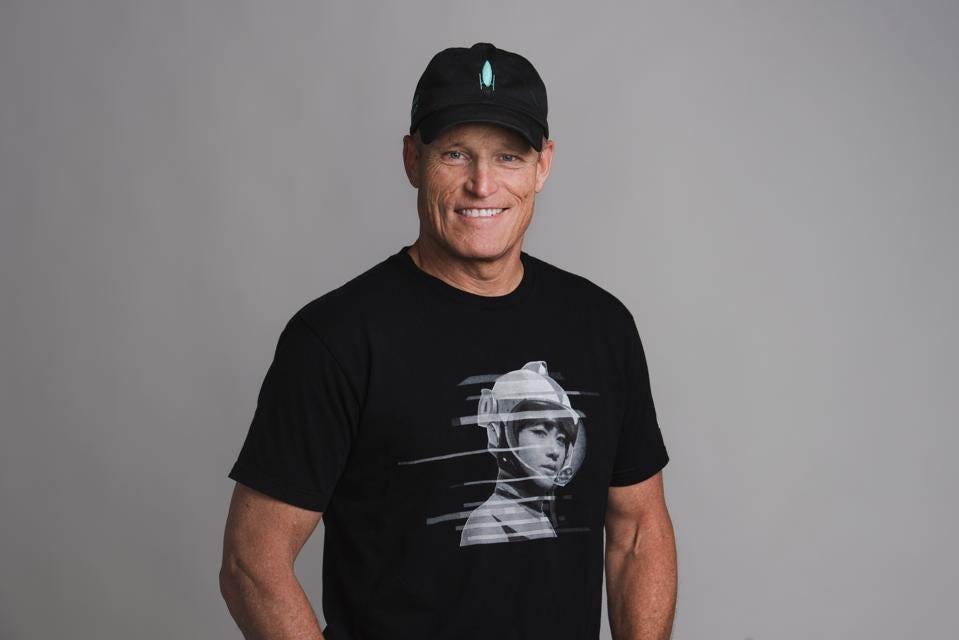
I recently spoke with Mike Betzer, the new CEO of Hypergiant, the Austin-based enterprise AI company.
This interview has been edited and condensed for clarity.
Karen Walker: How did you land at Hypergiant?
Mike Betzer: I spent 14 years growing MCI, and it was unbelievable. We were this tiny little company that was competing against AT&T, and our culture, hard work and winning attitude were phenomenal. I left after WorldCom bought it. I subsequently started a couple of companies with successful exits, and the last four years have been in the Vista Equity family honing my skills to build scale and capability.
I crossed paths with Ben Lamm, the founder of Hypergiant. And while Ben is a super creative, fantastic entrepreneur, he is not the guy to scale a SaaS company. That’s not what he likes to do. And that is what I love to do.
The opportunity was AI, in Austin, with an amazing team. There aren’t many times when that kind of triple play crosses your path.
Walker: Kudos to Ben for recognizing the need for change and for allowing himself to do the things he loves. He also provided Hypergiant the chance to have a CEO run the organization. How was that transition?
Betzer: It’s been unbelievably easy. You reach a place in your life when you realize what you’re good at, and what you’re not. Ben’s been successful enough that he doesn’t have to prove anything.
He’s been super helpful. He’s now the chief innovation officer because he’s the most creative guy I know. He’s also focused 100% on the U.S. Department of Defense, our fastest-growing sector.
Walker: What sets Hypergiant apart from other AI companies?
Betzer: There is so much data now! Consider, for example, the number of sensors in your home, in your car, in a tank, on an oil rig, or in the energy sector. But we aren’t making use of all this data. It’s still way too hard to take advantage of the information.
Hypergiant enables data scientists to use that data – to get the data, run models, and show results of those models in days. Today it would take a brand anywhere from six to nine months to stand up the hardware to do that. They have to answer questions like, “Should it be on AWS? Should it be on Azure?” Most companies just aren’t organized to do this quickly.
We can grab the data, public and private, put it together, and put it in models. We have all this already built out on AWS in a private cloud. Our new platform, Hyperdrive, makes this simple for data scientists. We think data scientists are the cool kids of the future, and we’re going to enable them to do what they want to do best, which is to show value in this data.
Walker: Where are you focused?
Betzer: We focus on three sectors. The first is the Department of Defense, where we have multiple classified projects.
The second industry for us is critical infrastructure. Think of energy; think of any type of utility. Think of oil and gas. If you look at the power outage that we had in Texas not that long ago, there are so many sensors around these power grids, and the companies need to know what’s going on and the probability of an outage during severe weather events.
Our third area of focus is enterprise companies. For example, we have a steel company client that we’re helping to predict the state of the steel supply chain based on internal data sets, combined with climate and shipping backlog data sets.
Walker: You also have something called an EOS Bioreactor at the Smithsonian.
Betzer: AI is software, but then it’s also deployed in hardware to make it smarter.
We wanted to figure out, “How can we clean air faster?” Our whole mission is AI for good, and that’s the goal of the bioreactor.
Walker: You came into this organization as a CEO taking over from a founder, and you’re growing super-fast. How did you adjust your team?
Betzer: Most of my team is the existing team, with deep roots in this space. We’ve added new product engineers, and our services team is unbelievably excited.
I’ve primarily adjusted communications – by understanding that people have one or two goals and by addressing those goals.
One is they want to win. And two, the team wants to do something that matters. If I’m going to spend my life working, I want to do something that matters. As CEO, I just help everybody understand, “This is the mission, and this is the plan.”
I’m a collaborative leader, so I didn’t come in here saying, “Look, I know all the things to do.” Instead I said, “Look, here’s where we are. Here’s the market. Here’s our opportunity. Where do you think we should go?” I take twice the time to bring the team along. They need to love the place and the culture. Culture wins. The culture is the most important thing.
Walker: So, you’ve not suffered much from the Great Resignation.
Betzer: We have lost very few people. I’ve been on board five months. I have not had one resignation in five months. I hadn’t even thought of that.
Walker: That’s saying something when a new CEO comes in, especially in a super- competitive market like Austin.
Betzer: I have a fantastic team. You and I, early in our careers at Compaq and MCI, have experienced “amazing.” And I want to recreate that.
Walker: You’re an experienced leader with a storied and successful career. The tagline for my business is up and to the right. That is where we always want to be, in the upper right-hand quadrant on the two-by-two matrix. Was there was there a pivotal moment in your career when you knew you were headed in that direction?
Betzer: The first time it happened was when we realized the rocket ship we were on at MCI. I can’t say the specific moment when it happened, but I realized that the team was so much more powerful than me as an individual.
I think it was probably one of my great bosses who helped me set my ego aside. At first, you get so proud, and think it’s you, and “I’m doing all this.” When you can set your ego aside and genuinely listen to everyone around you, it becomes so much better.
At MCI, they put me in a new role, and I didn’t understand why. Then, three years later, I realized, “Oh, they appreciated me!”
They were honing me to see the world from different viewpoints. And I’m a much better person because I’ve seen the world from different views – from sales, marketing, operations, IT technology.
When you can see the work from each other’s perspectives, the world is a better place.
